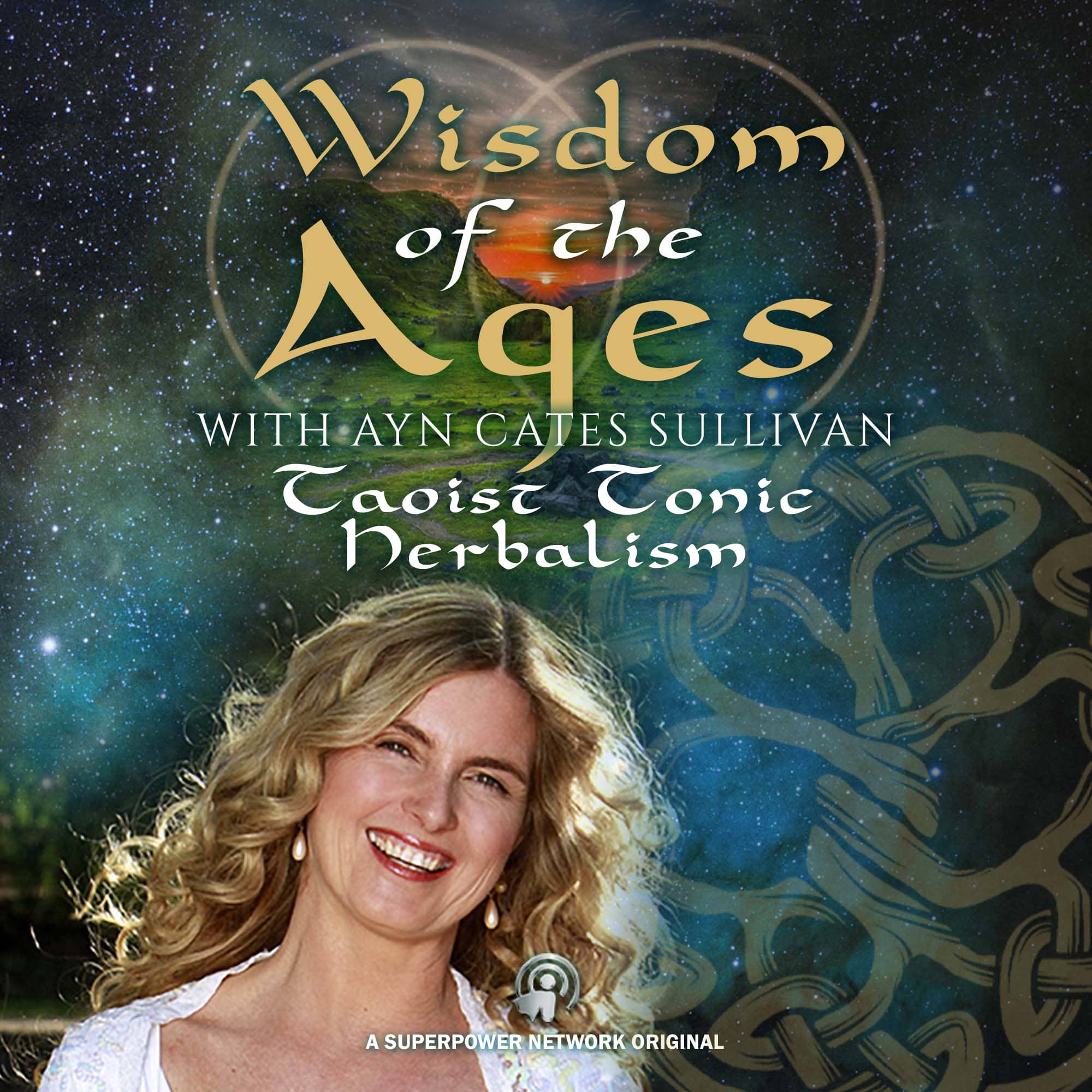
Taoist Tonic Herbalism
What is Taoist Tonic Herbalism? Why should we develop a love for herbs? In this episode of Wisdom of Ages, host Ayn Cates Sullivan and guest Rehmannia Dean Thomas discuss discovering ancient Taoist herbs that have worked for 5,000 years already. Rehmannia has an eight-year personal apprenticeship with master herbalist Ron Teeguarden. Tune in and find the new formula called Shield that helps provide people with a healthy immune system.
Ayn Cates Sullivan:
Welcome friends and mystical travelers. This is Ayn Cates Sullivan, host of Wisdom of the Ages, where we explore the wisdom traditions that support us in awakening to the truth of who we are. And you can find many more episodes on superpowerexperts.com/wisdom-of-the-ages. And if you want to go transcendent, really spiritual, check out my new podcast, superpowerexperts.com/messages-of-infinite-light. So today we’re going more into the roots of the tree. So my guest is Rehmannia Dean Thomas, or is it Rehmannia Dean Thomas? Or how does, how does your name go? I meant to ask you.
Rehmannia Dean Thomas:
You got it.
Ayn Cates Sullivan:
Rehmannia Dean Thomas. Okay, good. A Daoist tonic herbalist in the Gate of Life lineage, a 5,000-year-old herbal system from China. He’s authored multiple herbal guidebooks. And he has a new line. I’ve just been on looking at it, it looks absolutely amazing, this alchemy for the time we’re living in. So it’s called, it’s called rdeanthomas.com. So this is going to be really neat. It’s for the connoisseurs of tonic herbal formulas. I love it. So, Rehmannia, welcome to Wisdom of the Ages.
Rehmannia Dean Thomas:
Thank you so much, Ayn. Do you pronounce it Ayn or Ann, I’m sorry.
Ayn Cates Sullivan:
Well, it changes. This is why I asked you about your name. You know I’m a little bit of a shapeshifter. So, Anne, Ain, Ayn, come to me, but I used to go by Ayn.
Rehmannia Dean Thomas:
Ayn, I like Ayn, that’s cool.
Ayn Cates Sullivan:
I want to know more about these formulas. I’m fascinated. Okay. I know we are going to dive into each formula, or some of the formulas, after the ad break, but just, what got you started?
Rehmannia Dean Thomas:
How much time do I have in this, before the ad break?
Ayn Cates Sullivan:
Okay. You’ve got like four minutes, why Daoist tonic herbalism, and then we’ll go into 45 minutes, more in-depth, after the ad break.
Rehmannia Dean Thomas:
Okay, perfect. Yeah, in a nutshell, I’m a Daoist tonic herbalist in an ancient 5,000-year-old lineage from China called Gate of Life. Our lineage focuses on the use of a class of herbs called tonic herbs. Tonic herbs are the superior class of herbs in Chinese medicine, and they’re superior because they’re considered more of a class of superfoods really, than medicine. And so they’re used as a way of empowering us at very, very deep levels. But the beautiful thing about it is that the ancient masters who developed this over the last, at least 5,000 years, but actually in Chinese wild history, they think we’re more like about 30,000 years, this lineage of herbalism has been developed. And it was based on longevity, and overall empowerment, and homeostasis of the mind, body, and spirit. I imagine way back in those early days, the sicknesses that are prevalent today probably didn’t exist because the world was a. the diamagnetic frequencies and everything was more powerful. The soil was loaded with more minerals.
It wasn’t like people were sick, but what they wanted, was to attain immortality. They wanted to be climbing those mountains when they were over a hundred. And so what happened in China is that these legends started to come up, that there were these immortals that lived in the mountains, and they took the tonic herbs of my lineage. They became the deities of China. of religious folklore today. The eight immortals, four of them are tonic herbalists. Kwan Yin holds a flask of Schizandra in her hands as she drinks for her eternal beauty. And we use Schizandra in our formulas. So our and then when we’re called Daoist, a Daoist tonic herbalist, it’s because the Dao means the very center point of homeostasis between two extremes called yin and yang.
Yin is cool and wet. The Yang is hot and fiery. The idea of the Dao is to hold your point in the very center point between those. And so, we use tonic herbs, and we use this sort of alchemy that’s been developed over the centuries, to help us maintain that center point. It’s not like we’re trying to avoid the extremes of life, it’s that we can adapt to them better when we take tonic herbs. We found ourselves able to adapt to the stresses of life, be they occupational or psychospiritual. We find ourselves replenishing our hormones and our bones and standing stronger with upright chi and nourishing our blood, getting more sunlight in the blood, increasing metabolism. Just maintaining a youthful countenance through our lives, through the use of adding tonic herbs into our diet. And, I always stress, the diet itself is important, too. A person can’t live only on tonic herbs.
So if we combine a living seasonal, organic diet, responsible and diverse multidimensional diet with tonic herbal elixirs, which is what I’ve developed. Not popping capsules, but actually making yourself a hot elixir, very tasty, and the tonic herbs taste really good. And when combined, I believe we could, with the right knowledge and understanding and research, we could cultivate the ability to live very long disease-free lives.
Ayn Cates Sullivan:
I like it. Especially with the whole climate of the world right now. This is a really great idea. This is fantastic. So, let people know where they can find you.
Rehmannia Dean Thomas:
I have a new line that I’ve just come out with, and I’m very excited. They’re the most sophisticated formulas of my career. And I would say they represent a connoisseur’s line of tonic herbs. So I call it RDT Connoisseurs Line. And so people familiar with tonic herbs will recognize these formulas as being very, very sophisticated. I worked on them my whole career, which really began in about 1985, when I happened to go to China, into the North of China, where the herbs grow, by coincidence and saw the herbs. By then, my Chinese wife and I started making tinctures, in 1985. And it went until now. In 1998, I met my teacher, Master Herbalist, Ron Teeguarden.
Ayn Cates Sullivan:
Hold that thought there. We’ve got to do a little ad break, but I want to dive into this. What happened in China. What happened with Ron Teeguarden. This is super exciting. We’ll be right back. Okay.
For the best listening experience, download the Superpower Network App
Podcast: Play in new window

